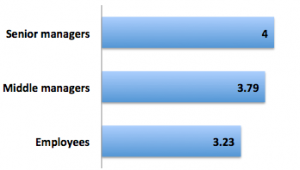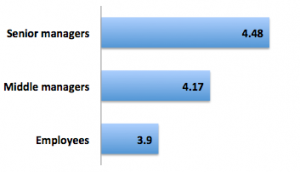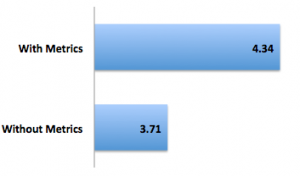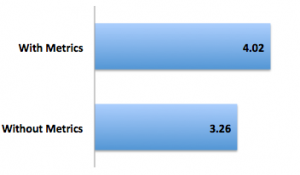It shouldn’t be surprising to find that senior managers are highly connected to corporate strategy but for front line employees that just isn’t the case.
If you want to connect corporate strategy to the daily action of all employees, you’ll have to make sure that employees know, understand and identify with the company strategy to begin with. After all, if they don’t buy the mission, just how hard do you think they’re going to work at fulfilling it?
We wanted to find out whether employees were connected to their corporate strategy and to see whether there is any difference to the degree of connection at senior ranks within a company compared to junior ranks. So we polled 1,000 full time employees in North America who have university degrees.
Our research set out to determine whether employees agreed with four simple statements.
- My company’s purpose makes me feel my job is important.
- My manager has discussed the company’s strategic plan with me.
- I understand my company’s objectives
- The company’s strategic plan makes sense.
To do the research we asked 1000 university graduates who are employed full time a variety of questions on their work environment and their job. We created a survey that asked respondents to select between the following responses to a series of questions.
- Strongly Agree (5);
- Agree (4);
- Neither Agree nor Disagree (3);
- Disagree (2); or
- Strongly Disagree (1)
So here are the results.
My company’s purpose makes me feel my job is important.
Many companies aren’t good at connecting employees with their mission. We believe that this is the first thing you need to do if you want effective strategy execution, connect employees with company mission.
We asked employees to tell us whether their company’s purpose makes their job seem important. This is effectively asking whether or not they are emotionally connected with the company’s mission.
- Overall there are about many employees who are highly supportive of their company’s mission as there are ones who don’t support it.
- For senior managers though, there are almost 4 times as many who are highly supportive than ones who are not.
- But for front-line employees, there are more than twice as many who are not supportive of the company’s mission as there are those who are highly supportive.
Overall the results are pretty anemic. There are as many people who are mission Disconnected as Connected.
Where the research starts to get interesting though is looking at employees versus managers. What we’ve seen is that employees aren’t nearly as enamored with their company’s mission as managers are. Employee Rating for this question line up as follows:
 Senior managers are probably walking around in the clouds, thinking that everyone is just as committed to the company’s purpose as they are when in fact, employees are more likely to be disconnected than connected.
Senior managers are probably walking around in the clouds, thinking that everyone is just as committed to the company’s purpose as they are when in fact, employees are more likely to be disconnected than connected.
My manager has discussed the company’s strategic plan with me.
The second step in connecting employees with the mission is to actually discuss the strategic plan with each and every one of them.
For the most part though, our research shows that employees don’t really understand company strategy. We set out to determine simply whether their manager had discussed the strategy with them and the results are more negative than we expected. Overall, there are more Disconnected than Connected.
The research has shown what we anecdotally knew to be true. Company strategy is being discussed at the senior management level and to a lesser extent at the manager level but employees are not getting the message. The following chart shows the Employee Rating for each of these three groups.
 That begs the question, how can employees support the company strategy if they don’t even know what that strategy is. There is a great story from NASA in the early days. A visiting group of US Senators was walking around NASA and cam upon a cleaner sweeping the floors. They asked him what he did for NASA and he replied that he was helping to put a man on the moon. He knew the strategy and was connected with it.
That begs the question, how can employees support the company strategy if they don’t even know what that strategy is. There is a great story from NASA in the early days. A visiting group of US Senators was walking around NASA and cam upon a cleaner sweeping the floors. They asked him what he did for NASA and he replied that he was helping to put a man on the moon. He knew the strategy and was connected with it.
What we also asked in the research was whether employees had a clear method for measuring their results, whether they had metrics. What we found was that where employees had clear metrics, managers had to be discussing the company’s plan with them. The following table shows the Employee Rating with and without Metrics.
 What we surmise from these results is that in order to have metrics in place for employees, managers need to have discussions about the strategic plan and the result is better-connected employees.
What we surmise from these results is that in order to have metrics in place for employees, managers need to have discussions about the strategic plan and the result is better-connected employees.
I understand my company’s objectives
Southwest Airlines has an enviable record of success in an industry not noted for extended runs of profitability or even for that matter, staying out of bankruptcy. In 2012, they celebrated their 40th straight year of profitability. One of the best-managed companies in the world, they are very clear about their objective, to be the lowest cost airline flying. This is ingrained in every employee. They know their company objective.
If you don’t know where you’re going then every road will take you there. It isn’t enough that employees discuss the strategy with their senior management but they have to understand it, they have to understand why it exists as it does.
We wanted to find out whether employees actually understand what their company objectives are so we asked them to agree with the statement “I understand my company’s objectives.”
We’re pleased to report that for the most part, employees do understand their company objectives.
- Almost 20% of all employees don’t understand their company’s objectives.
- Surprisingly 13% of company managers don’t understand those objectives
- For front-line employees, while many understand the basics, there are just as many who have a good understanding as those who have no understanding at all.
However time after time we find that while senior managers know something, this isn’t true for front-line employees. The following is a summary of Employee Rating for three groups within a company.
 If you sit in a management seat, it is all too easy to imagine that everyone else is thinking or knows pretty much what you know about basics like company objectives but that isn’t always the case. For the most part, there are a lot of front line employees who have absolutely no understanding of the company’s objectives.
If you sit in a management seat, it is all too easy to imagine that everyone else is thinking or knows pretty much what you know about basics like company objectives but that isn’t always the case. For the most part, there are a lot of front line employees who have absolutely no understanding of the company’s objectives.
As with our previous findings, there is a marked difference for corporations with metrics and those without. The following table shows the Employee rating with and without Metrics.
 What we take from this is that the existence of metrics and the management style that goes with its implementation enables employees to understand their company objectives better.
What we take from this is that the existence of metrics and the management style that goes with its implementation enables employees to understand their company objectives better.
The company’s strategic plan makes sense.
Finally, we wanted to find out whether employees think that the strategic plan makes any sense. It is one think to know what it is or to understand why it is as it is, but it is entirely another thing to agree that it makes sense.
To find out, we asked our respondents to agree with the statement “The company’s strategic plan makes sense.”
- Almost 35% of all employees don’t think their company’s strategic plan makes sense.
- Senior managers are very likely to be supportive of the plans they create with 84% thinking they make sense.
- But in terms of front-line employees, there are 4 times as many who strongly support the plan as those who think it makes no sense.
Our results show that when you look at the total population of employees surveyed, to some degree, the company’s strategic plan makes sense.
But behind these numbers is an entirely different story. As you might expect, senior managers at a company thinks the plan makes eminent sense but for front-line employees this is clearly not the case. The following chart shows the Employee rating for each of these groups.
 Senior managers think the plan makes sense because they created it. Unfortunately, the degree of connection to the plan’s creation shows a direct relationship with whether or not the plan makes sense.
Senior managers think the plan makes sense because they created it. Unfortunately, the degree of connection to the plan’s creation shows a direct relationship with whether or not the plan makes sense.
We’ve probably all been there at some time in our careers, having to do something that makes absolutely no sense. Just how much effort are you going to put into something that is what you consider to be bone-headed at best? Not likely very much. Unfortunately though this is happening every day in corporations all over the world.
Once again though, having metrics caused a big difference in whether thought the company’s strategic plan made sense. The following table shows the Employee rating with and without Metrics.
 While there may not be a causal factor at work here, in test after test, we are finding a strong correlation between the existence of good metrics and better employee connection to strategy.
While there may not be a causal factor at work here, in test after test, we are finding a strong correlation between the existence of good metrics and better employee connection to strategy.
Conclusions
Strategy execution starts with employees knowing what the company is trying to achieve and supporting those objectives. Unfortunately, while senior management understands and supports the strategy, this is often not the case with front-line employees. This is Broken Telephone at its worst. Managers who want to solve this problem will need to develop systems to ensure that employees know what the company is doing and are on board with its plans.
Our research is also clearly indicating that one of the best ways to solve Broken Telephone is to use well-developed metrics.
Sign up to get future research
Why not sign up for our regular reports. They come out about nine times a year. Fill out the following form to sign up.
